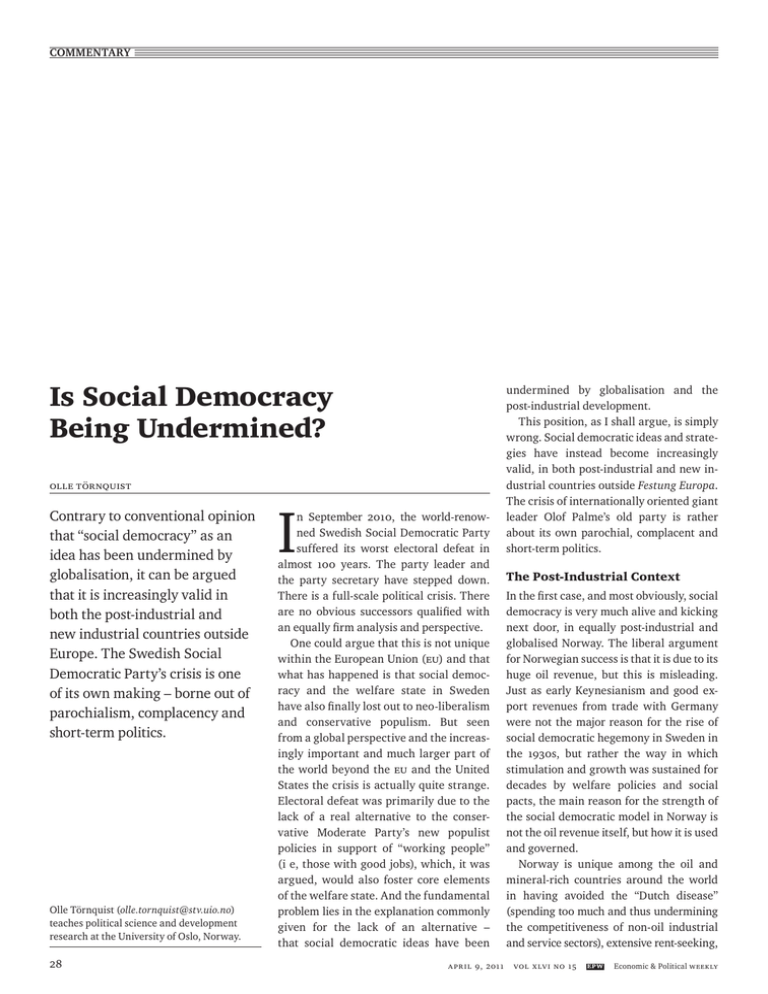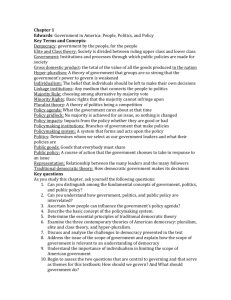Is Social Democracy Being Undermined?
advertisement

COMMENTARY AEW aircraft from Sweden. Pakistan also received large numbers of air to air missiles and guided bombs from China and US and anti-radar missiles from Brazil. In recent years, the composition of the five largest recipients has ­remained relatively stable. In the period 2006-10, their share of volume of transfers dropped from 39% in 2001-05 to 30% ­(Table 2, p 27). The total volume of India’s arms imports over the past five years is about $40 billion. This figure is going to increase with each passing year as several big-­ticket deals are in the process of being signed. There is the $10 billion deal for 126 multirole combat aircraft, the $7 billion deal for supply of C130 J and Globemaster-17 transport aircraft by the US, the ongoing Scorpene submarine deal with France valued at $4 billion and several smaller deals for maritime aircraft, guns, radars, helicopters, missiles and tanks valued cumulatively at several billion dollars. Based on current allocations, over the next five years India is expected to spend $75 billion on procurement of conventional weapon systems out of which $60 billion worth of equipment will be imported (our estimates). This may be good news for the arms industry but there is a need to utilise the capacity of the 39 ordnance factories and nine public sector units which have been created at heavy public expense. It is also a matter of grave concern that India continues to import state of the art Is Social Democracy Being Undermined? Olle Törnquist Contrary to conventional opinion that “social democracy” as an idea has been undermined by globalisation, it can be argued that it is increasingly valid in both the post-industrial and new industrial countries outside Europe. The Swedish Social Democratic Party’s crisis is one of its own making – borne out of parochialism, complacency and short-term politics. Olle Törnquist (olle.tornquist@stv.uio.no) teaches political science and development research at the University of Oslo, Norway. 28 I n September 2010, the world-renow­ ned Swedish Social Democratic Party suffered its worst electoral defeat in almost 100 years. The party leader and the party secretary have stepped down. There is a full-scale political crisis. There are no obvious successors qualified with an equally firm analysis and perspective. One could argue that this is not unique within the European Union (EU) and that what has happened is that social democracy and the welfare state in Sweden have also f­inally lost out to neo-liberalism and c­onservative populism. But seen from a global perspective and the increasingly important and much larger part of the world b­eyond the EU and the United States the crisis is actually quite strange. Electoral defeat was primarily due to the lack of a real alternative to the conser­ vative Moderate P­arty’s new populist policies in support of “working people” (i e, those with good jobs), which, it was argued, would also foster core elements of the welfare state. And the fundamental problem lies in the explanation commonly given for the lack of an alternative – that social democratic ideas have been defence equipment whilst languishing in the human development index. There seems to be a direct connection between the fact that India tops the list of arms ­importers and also tops in rates of child-­ malnutrition. Given the profligacy of the security establishment, it is highly un­ likely that defence spending will be ­reduced to 1.76% of the GDP by 2014-15 as recommended by the Thirteenth Finance Commission. In the budget for 2011-12, the total defence outlay (inclusive of ­defence civil estimates) is Rs 2,02,571 crore which is 2.3% of the expanded GDP. With several heads of state visiting New Delhi primarily to push weapon sales, the only direction that figure will move is northwards. undermined by globalisation and the post-i­ndustrial development. This position, as I shall argue, is simply wrong. Social democratic ideas and strategies have instead become increasingly valid, in both post-industrial and new industrial countries outside Festung Europa. The crisis of internationally oriented giant leader Olof Palme’s old party is rather about its own parochial, complacent and short-term politics. The Post-Industrial Context In the first case, and most obviously, social democracy is very much alive and kicking next door, in equally post-industrial and globalised Norway. The liberal argument for Norwegian success is that it is due to its huge oil revenue, but this is misleading. Just as early Keynesianism and good export revenues from trade with Germany were not the major reason for the rise of social democratic hegemony in Sweden in the 1930s, but rather the way in which stimulation and growth was sustained for decades by welfare policies and social pacts, the main reason for the strength of the social democratic model in Norway is not the oil revenue itself, but how it is used and governed. Norway is unique among the oil and mineral-rich countries around the world in having avoided the “Dutch disease” (spending too much and thus undermining the competitiveness of non-oil industrial and service sectors), extensive rent-seeking, april 9, 2011 vol xlvi no 15 EPW Economic & Political Weekly COMMENTARY corruption and excessive national chauvinism. And this can only be ­explained by the long tradition of social democratic politics and institutions (Mehlum et al 2008). Today moreover, the Norwegian social democratic party, the Labour Party, has even regained its p­osition in the wake of devastating losses in the 2001 elections which were due to conflicts between trade unions and Tony Blair-like factions. The remarkable comeback was thanks to reemphasising the Scandinavian model coupled with efforts to make the state and public services much more efficient and user-oriented in alliance with the greenish Socialist Left Party (which in contrast to the Swedish Left Party has no communist heritage) and the rural-based Centre Party (which in contrast to its Swedish counterpart has not given in to neo-liberalism). Since 2005 the joint­ focus has been on social and ­gender equality, universal welfare and full employment as well as efficient public services and stra­tegic investment at the expense of privatisation and tax reductions. Of course there are challenges, but even wide sections of the elite in general, the business community and the political opposition seem to support the basic S­candinavian model. The New Industrialising Countries Even more crucial, social democratic ideas have also become more relevant in globalised Asia, Africa and Latin America. There are two major reasons. The first is that the main argument of Scandinavian social democracy, inspired by Eduard Bernstein, has gained ground at the expense of Karl Kautsky’s earlier economic determinism and Vladimir Lenin’s revolution: namely, that one must advance by way of transformative politics and that one can do it by way of democratisation.1 It is true that the negative effects of colonialism and the cold war remain substantial. Authoritarian regimes as in ­China and Burma survive (and at worst in Libya too). Elsewhere, the third wave of demo­cracy has often been contained by powerful elites and abuses of power, while frustrated middle classes look to military support for “law and order”, as in Thailand. Yet the space for action has broadened. Even in Tunisia and Egypt peaceful pro-democracy demonstrations succeeded in undermining authoritarian regimes. Elitist and even authoritarian structures no longer seem invincible. It is true that most democratisation has been formal and minimalist. But the activists who want to foster real and substantive democracy (where ordinary people can exert genuine control over public affairs and ensure that decisions to change relations of power and promote welfare are implemented) are o­ften able to advance by developing rudimentary forms of demo­ cracy. It was more democracy that made peace possible in Aceh after the tsunami, in stark contrast to Sri Lanka.2 It is citizen involvement in planning and budgeting, and in health councils amongst others, that have redu­ced the abuse of power in Brazil. It is the demand for public welfare and democratic channels of influence for trade unions, business actors, activists and experts that gain momentum in countries as diverse as South Africa and Indonesia. And with these developments comes an increased interest in the history of the most successful democracy project – the Scandinavian. Another reason for the increasing relevance of social democracy in the larger part of the world is the rapid economic growth of major powers such as China, I­ndia, Brazil and South Africa. Here deve­ lopment is more uneven than in the classical developmental states such as South Korea and Taiwan. The robber barons’ i­nvestments are not always productive and coordinated. On the one hand, several business actors and middle class groups benefit, alongside farmers and skilled workers. On the other hand, the number of people employed on a temporary basis also increases. Poor peasants are marginalised. Agricultural and casual workers are often unemployed. There are more petty traders, scavengers and poor children. India’s economic growth, for instance, is based on services and advanced production rather than industries where ordinary people can get a job. A general problem in the countries with rapid growth is that the different sectors often do not support each other. This cements uneven development and huge inequalities. As a consequence, demand spreads for investment that generates more jobs in Economic & Political Weekly EPW april 9, 2011 vol xlvi no 15 combination with equal wages and social security in an increasing number of countries. China is still short of a general ­welfare system, but social democratic governments have made some improvements, such as Brazil. India too has implemented at least a comparatively universal scheme for rural employment. A major reason for activists’ chances to ­initiate such programmes even when not in power, and then use them as a platform for advances is related to the fact that old hierarchies are being undermined, protests are on the increase and rulers need to win elections. Moreover, a new and very extensive r­eport from the United Nations Research I­nstitute for Social Development (UNRISD 2010) shows that efforts at combating ­poverty and inequality guided by the ­ideas of the International Monetary Fund and the World Bank have often failed because power relations have been neglected. S­uccesses rest instead with structural changes made through state-led economic growth on the basis of full employment in productive sectors and universal social ­security arrangements. This, in turn, has called for progressive coalitions of sufficiently powerful actors – and sufficient democracy with which to build them.3 For UNRISD too, then, Scandinavian social democracy serves as an important point of reference. The main focus of interest lies in the successful combination of welfare and growth that was initiated in the 1930s against aggressive capitalism and industrial conflict, economic depression and widespread outright poverty.4 The fundamental condition for success was that the benefits of early Keynesian stimulation of the economy and the favourable export markets could be sustained thanks to ­central level collective agreements between employers’ associations and trade unions, with the support of the new social democratic government.5 On the one hand, trade unions won collective agreements with the employers on equal wages. This was to benefit the lowpaid majority of the workers and created more jobs by increasing the competitiveness of the modern export industry as well as enforcing investment and economic growth in weak sectors. In addition, the wage-earners gained basic welfare from the 29 COMMENTARY State, including pensions, social security, improved housing, education and training and unemployment schemes. And over the years they also came to influence the central and local governments’ executive boards and commissions (and to some ­extent corporate boardrooms). On the other hand, the dynamic entrepreneurs gained industrial peace, a flexible labour market and the potential for rationalising production, wage levels based on what companies exposed to international competition could pay, and a public insurance system that took responsibility for social welfare. This was not in order to negate class struggle but to institutionalise democratic institutions as possible for fair negotiations that fostered social and economic development. This is how economic growth and public revenues increased by way of comparatively equal wages, full employment and social security. And it is in this way that democratic regulation of society became more important than nationalisation. It is true of course that preconditions in the larger part of the world for similarly strong organisations, public institutions and positive government are less favour­ able, including in India. But the development of these prerequisites in Scandinavia was just as much about politics and policies as historically rooted structures – and once the latter have been identified, one may discuss ways of compensating for the lack of them. To specify relevant experiences, one should of course take carefully identified problems in other contexts as a point of departure – not repeat the mistakes of both the liberal and Marxian modernisation schools that tried to export turn-key solutions from one context to the other. For example, the problems of democracy and development that have been identified by concerned scholars in joint antho­ logies on the depoliticisation of democracy and dilemmas of popular representation call for comparisons with three historical processes in Scandinavia that might provide useful input into critical discussions in other contexts too.6 The first of these processes is rooted in the relatively early demands in Scandinavia for universal welfare programmes through the state and local authorities rather than targeted and means-tested 30 measures and supplementary self-help and education through civil organisations, which remain the predominant pattern in other contexts. The price for this was weaker popular organisations.7 But the benefit was that the popular movements themselves were able to contain “special interests” in favour of the “common good” and to gain support from popular majorities. And it was possible for the social democrats to not just include workers but also most of the unemployed, peasants, small business actors, civil servants and private employees within its ideology of turning Sweden into a democratic inclusionary “people’s home” based on solida­r ity and generalised welfare schemes. This may be particularly interesting to countries with a substantial informal sector employment and agricultural populations. Thus the social democrats succeeded in winning elections, providing a viable alternative to the fascist “national home” programmes that gained popularity in many other countries during the 1930s and early 1940s. Thus it was possible to also foster the independence and aspirations of youth and women by way of universal state support to the individual rather than the family – as in the less generous Christian democratic welfare state model, or through the market and civil society – as in the liberal model adopting a system of means-tested basic subsidies.8 The second process was that the labour movements – and almost as importantly the employers too – coordinated their organisations. In addition, demands for the representation of interest and issuebased organisations in public governance (the so-called social or plural corporatism) generated rules and regulations that also fostered broad, national and democratic organisations. Third, interest-based representation supplemented the liberal democratic general elections (where the winner takes it all) and autonomous civil society (often dominated by resourceful citizens and generating a myriad of lobby and pressure groups). And this, in turn, fostered public spheres for cooperation, control and ­influence that contributed to the unique Swedish trust in a strong state and possibly interpersonal trust or so-called social capital too. Implications Social democratic thinking has thus b­ecome relevant in the larger part of the world because of the wider space for at least limited democracy and industrial growth in the context of globalisation. But it has also become important because it generates ideas for how to OMEO KUMAR DAS INSTITUTE OF SOCIAL CHANGE AND DEVELOPMENT (Sponsored by Indian Council of Social Science Research and Government of Assam) V.I.P. Road, Upper Hengrabari, Guwahati – 781 036, Assam, INDIA Phone: 0361-2335205(D), 2313023(O), 2313064(O) Fax:0361-2313036 E-mail: dkdscd@yahoo.co.in Call for Papers The Institute invites articles, review articles and book reviews focusing on issues of the north eastern region of India for its peer reviewed bi-annual journal Social Change and Development. The submissions should be within the limit of 6000-8000 words accompanied by an abstract of about 150 words. An electronic version of submission is solicited in MS Word format. Kindly mention e-mail and current address for communication. Editor Social Change and Development april 9, 2011 vol xlvi no 15 EPW Economic & Political Weekly COMMENTARY harness globalisation by way of more d­emocracy in favour of coalitions for ­welfare-based growth. But does the growing relevance of s­ocial democracy in the larger part of the world mean that it will regain importance in countries like Sweden too? The answer is that this is not impossible, so long as a less parochial approach to politics is developed. Renewed Importance Of course, Sweden just like Norway has become quite post-industrial and is similar to the EU and US. But at the same time countries like Sweden are now much more integrated than before with the l­arger part of the world – and therefore the basics of the social democratic project are gaining renewed importance with us too. First, countries like Sweden have also been affected by some of the drawbacks that have long since been experienced by South African and Brazilian trade unions. So it is now our turn to learn. These u­nions have, inter alia, extensive experience in finding a way to hold together their movements, while employers reduce the number of employees on permanent contracts, engage temporary labourers, outsource parts of the production and pit m­igrant labourers and immigrants against local workers. Second, our discussion on how unemployed youth, immigrants, small business actors and overstretched middle class families can be included in fair programmes of work, welfare and services, instead of being atomised by unequal private solutions is also not unique. In the larger part of the world the issue may be more about democratic alternatives for the many workers, casual labourers, peasants, petty business actors, urban poor and those in the middle classes who must seek support from patrons, and ethnic and religious organisations. But the common fundamental challenge is inclusion and basic rights. Third, the same applies to supplementary democracy through which fragmented movements and committed experts can come together and participate in the planning and management of society, and thus also contain corruption, such as in Brazil and as attempted through Kerala’s decentralised planning campaign. Similar reforms may well be required in Scandinavia too, so that it is not just the established organisations and networks that have a say, thus undermining the trust in the public institutions. Fourth, countries like Sweden have b­ecome more dependent of the fact that the products that we need (or at least d­emand) are increasingly being manufactured elsewhere, inexpensively and in such a way that people suffer and the environment is degraded or even destroyed. Most of us are thus powerless in face of the market-led globalisation and the states and companies that neglect democracy and human rights. In this context of power relations the buying and selling of emission allowances on the market and depoliticised and managerial development c­ooperation are insufficient. Rather (or at least in addition), there is a need for much greater international cooperation between progressive local forces that can harness globalisation, in the same spirit as when capitalism was regulated in Scandinavia in the 1930s. This is not impossible. As we have seen there are likeminded people for Scandinavian social democrats to cooperate with in the global South. Our potentially powerful common-value system could also be mobilised. But while Norway at least ­engages globally, the Swedish election campaign as well as the debate about the crisis and the selection of new leadership primarily reflects complacency and European provincialism. Even Olof Palme’s old party has said next to nothing about ­Sweden’s role in the world. Very little has been said about foreign policies and international development cooperation. Not a word on how one might foster policies for structural change and the vitalisation of welfare and democracy as part of inter­national i­nterest in social democracy to harness globalisation.9 In short, the problem is one of parochial politics, not of the basic ideas. It is the Swedish party – not social demo­cracy – that is undermined. Notes 1 For the theoretical roots of Scandinavian social democracy in Bernstein’s idea of the primacy of politics, see Berman (2006). 2 For this largely untold story, see Törnquist et al (2010). Economic & Political Weekly EPW april 9, 2011 vol xlvi no 15 3 The report is entitled Combating Poverty and ­I­n­equality: Structural Change, Social Policy and Politics, Geneva 2010, and can be downloaded from www.unrisd.org 4 The standard references in English include Esping-Andersen (1985) and Przeworski (1985), For comparisons with the United States see Swenson (2002), with other ­welfare states, EspingAndersen (1990). 5 Moene and Wallerstein (2006) put this very well. 6 Harris et al (2004) and Törnquist et al (2009). 7 Except for one compromise: the state supported trade union-based unemployment benefit s­ocieties in Sweden and Denmark. 8 On the different models, see Esping-Andersen (1990). 9 A previous Swedish version of this article was ­rejected by the party’s theoretical magazine but will by published later this year through the ­social democratic-oriented think tank, Arena. Thanks to Teresa Birks for editing the English ­version. References Berman, Sheri (2006): The Primacy of Politics: Social Democracy and the Making of Europe’s Twentieth Century (New York: Cambridge University Press). Esping-Andersen, Gösta (1985): Politics against Markets: The Social Democratic Road to Power (Princeton NJ: Princeton University Press). – (1990): The Three Worlds of Welfare Capitalism (Cambridge: Polity Press). Harris, John, Kristian Stokke and Olle Törnquist, ed. (2004): Politicising Democracy: The New Local Politics of Democratisation (Houndmills, Basingstoke: Palgrave). Mehlum, Halvor, Karl Monene and Ragnar Torvik (2008): Mineral Rents and Social Development in Norway (Oslo: ESOP), (Equality, Social Organisation and Performance) (available at www.esop. uio.no). Moene, Karl and Wallerstein Michael (2006): “Social Democracy as a Development Strategy” in P Bardhan, S Bowles and M Wallerstein (ed.), Globalisation and Egalitarian Redistribution (Princeton NJ: Princeton University Press). Przeworski, Adam (1985): Capitalism and Social ­Democracy (New York: Cambridge University Press). Swenson, Peter A (2002): Capitalists against Markets: The Making of Labor Markets and Welfare States in the United States and Sweden (Oxford: Oxford University Press). Törnquist, Olle, Webster Neil and Kristian Stokke (2009): Rethinking Popular Representation (New York: Palgrave). Törnquist, Olle, Stanley A Prasetyo and Teresa Birks, ed. (2010): Aceh: The Role of Democracy for Peace and Reconstruction, 2nd edition (Jogjakarta and Singapore: PCD Press and ISEAS). UNRISD (2010): Combating Poverty and Inequality: Structural Change, Social Policy and Politics, ­Geneva (available at www.unrisd.org). available at K C Enterprises 3-6-136/6, Street No 17 Himayathnagar Hyderabad 500 029 Andhra Pradesh Ph: 66465549 31








